Gregory Justina - Euripides and the Instruction of the Athenians
Here you can read online Gregory Justina - Euripides and the Instruction of the Athenians full text of the book (entire story) in english for free. Download pdf and epub, get meaning, cover and reviews about this ebook. City: Ann Arbor, year: 1997, publisher: University of Michigan Press, genre: Romance novel. Description of the work, (preface) as well as reviews are available. Best literature library LitArk.com created for fans of good reading and offers a wide selection of genres:
Romance novel
Science fiction
Adventure
Detective
Science
History
Home and family
Prose
Art
Politics
Computer
Non-fiction
Religion
Business
Children
Humor
Choose a favorite category and find really read worthwhile books. Enjoy immersion in the world of imagination, feel the emotions of the characters or learn something new for yourself, make an fascinating discovery.
- Book:Euripides and the Instruction of the Athenians
- Author:
- Publisher:University of Michigan Press
- Genre:
- Year:1997
- City:Ann Arbor
- Rating:4 / 5
- Favourites:Add to favourites
- Your mark:
- 80
- 1
- 2
- 3
- 4
- 5
Euripides and the Instruction of the Athenians: summary, description and annotation
We offer to read an annotation, description, summary or preface (depends on what the author of the book "Euripides and the Instruction of the Athenians" wrote himself). If you haven't found the necessary information about the book — write in the comments, we will try to find it.
Euripides and the Instruction of the Athenians — read online for free the complete book (whole text) full work
Below is the text of the book, divided by pages. System saving the place of the last page read, allows you to conveniently read the book "Euripides and the Instruction of the Athenians" online for free, without having to search again every time where you left off. Put a bookmark, and you can go to the page where you finished reading at any time.
Font size:
Interval:
Bookmark:

First paperback edition 1997
Copyright by the University of Michigan 1991
All rights reserved
Published in the United States of America by
The University of Michigan Press
Manufactured in the United States of America
2000 1999 1998 1997 4 3 2 1
Library of Congress Cataloging-in-Publication Data
Gregory, Justina.
Euripides and the instruction of the Athenians / Justina Gregory.
p. cm.
Includes bibliographical references and index.
ISBN 978-0-472-10230-3 (alk. paper)
ISBN 978-0-472-08443-2 (pbk : alk. paper)
ISBN 978-0-472-02770-5 (EBook)
1. EuripidesCriticism and interpretation. 2. Greek drama (Tragedy)History and criticism. 3. Political plays, Greek History and criticism. 4. Didactic drama, GreekHistory and criticism. 5. Athens (Greece)-Intellectual life. I. Title.
PA3978.G68 1991
882 .01-dc20 90-27859
CIP
No part of this publication may be reproduced, stored in a retrieval system, or transmitted in any form or by any means, electronic, mechanical, or otherwise, without the written permission of the publisher.
To Patrick
Portions of appeared in article form in Hermes 107, 1979 (Euripides Alcestis), Yale Classical Studies 25, 1977 (Euripides Heracles), and Eranos 84, 1986 (The Power of Language in Euripides Troades). I am grateful to Franz Steiner Verlag and Cambridge University Press, publishers of Hermes and Yale Classical Studies, and to Stig Y. Rudberg, editor of Eranos, for permission to reprint.
Smith College allowed me time off from teaching in 198687, as well as financial assistance in the form of a grant from the Andrew W. Mellon Fund. Audrey Ryan and Anne Deutsch helped in preparing the typescript. I would particularly like to thank John Graiff, head of interlibrary loan at Neilson Library, for his efforts on my behalf.
Ellen Bauerle, my editor at the University of Michigan Press, gave me much help and advice. The Department of Classics of the University of Edinburgh extended a hospitable welcome and made available to me the resources of its library.
For information, comments, and criticism I am indebted to Paula Arnold, Victor Bers, George Dimock, Richard Garner, Lisa Kallet-Marx, David Kovacs, Ann Michelini, Krishna Winston, and several anonymous referees. The remaining errors of fact and judgment are my own.
The earliest assessments of tragedy we possessone by a fourth-century philosopher, the other by a fifth-century comic poetbear witness to the organic connection between tragedy and the Athenian polis. Aristotle, to be sure, refers to it only in passing. In the Poetics, while discussing the element of thought in tragedy, he remarks that the older poets (that is, the fifth-century tragedians) made their characters speak politik s, in a political vein, whereas those of his own day make their characters speak rh
s, in a political vein, whereas those of his own day make their characters speak rh torik
torik s, in a rhetorical vein. If (as seems likely) Aristotle is using the term in the same sense in both passages, then his remark offers a preliminary indication that the political and ethical components of Greek tragedy will be closely conjoined.
s, in a rhetorical vein. If (as seems likely) Aristotle is using the term in the same sense in both passages, then his remark offers a preliminary indication that the political and ethical components of Greek tragedy will be closely conjoined.
Aristophanes, on the other hand, considers the political role of tragedy directly and at length. The climax of the Frogs is an ag n or poetry contest that takes place in the underworld under the auspices of the god Dionysus. The shades of Aeschylus and Euripides are vying for the title of best tragedian; the realm of Hades, it seems, bears a curious resemblance to Athens, where tragedians competed for first prize at the City Dionysia. Just as at Athens public benefactors were rewarded with free entertainment and favored seating in the Prytaneum or city hall, so in the underworld the winner of the contest will enjoy meals in the Prytaneum and a seat next to Pluto (Frogs 764-65).
n or poetry contest that takes place in the underworld under the auspices of the god Dionysus. The shades of Aeschylus and Euripides are vying for the title of best tragedian; the realm of Hades, it seems, bears a curious resemblance to Athens, where tragedians competed for first prize at the City Dionysia. Just as at Athens public benefactors were rewarded with free entertainment and favored seating in the Prytaneum or city hall, so in the underworld the winner of the contest will enjoy meals in the Prytaneum and a seat next to Pluto (Frogs 764-65).
Euripides, arguing his own cause, claims to have freed tragedy from the cumbersome staging and obscure language favored by his rival. He explains that he has substituted a leaner, more tightly structured, democratic form (952) that is relevant to the spectators daily life and allows them room for discrimination and judgment. Aeschylus presently demands, On what grounds should we admire a tragedian? Euripides is unhesitating in his reply: For his skilfulness and his admonitions, because we improve the people in the cities (1009-10).
Aeschylus has no quarrel with this formulation. He concurs with Euripides on the didactic function of tragedy: For children it is the schoolteacher who instructs; for grown-ups, it is the poet.
The association between poetry and teaching is a recurrent motif in the Frogs. The parabasis leads off with the statement that it is right for the chorus to offer good advice and instruction to the city (chr sta tei polei xumparainein kai didaskein, 686-87). At a later point in the play Aeschylus associates his own inspirational and instructive practice with that of a distinguished group of predecessors: Orpheus, Musaeus, Hesiod, and Homer (1032-36). In identifying the poets as the fountainhead of practical and moral wisdom he is on firm historical ground. There is an important element in early, archaic, and classical verse that might be called, broadly, educational or culturally formative. Homer, Hesiod, Solon, Xenophanes, Theognis, to name a few, all address themselves, in greater or lesser degree, to the information and admonition of their audiences.
sta tei polei xumparainein kai didaskein, 686-87). At a later point in the play Aeschylus associates his own inspirational and instructive practice with that of a distinguished group of predecessors: Orpheus, Musaeus, Hesiod, and Homer (1032-36). In identifying the poets as the fountainhead of practical and moral wisdom he is on firm historical ground. There is an important element in early, archaic, and classical verse that might be called, broadly, educational or culturally formative. Homer, Hesiod, Solon, Xenophanes, Theognis, to name a few, all address themselves, in greater or lesser degree, to the information and admonition of their audiences.
But Aristophanes has in mind something more precise than cultural formation. In the course of the contest between the two rivals, it emerges that the improvement of the polis is the goal of the poet's instruction; it is in that sense, according to Aristophanes, that tragedy aspires to the political. As we have seen, the chorus offers its good advice to the city, and Euripides asserts that the tragedian should make the people better in the cities. Defending himself against Aeschylus accusations, Euripides inquires indignantly in what way his passionate female protagonists harm the city (1049). Dionysus ultimately informs the two tragedians that he intends to bring back with him to the upper world whichever one of you can give the city some useful advice (1420-21)a charge that each does his best to satisfy.
These passages make assumptions that may appear startling to modern readers, but are taken for granted by the two contestants; presumably they reflect fifth-century preconceptions about poets and poetry. There is no concern that aesthetic and political purposes might inhibit one another; rather, artistry and admonition are said to operate in tandem (cf. 1009-10). The domain of private life is not envisaged as separate from the public realm; both dramatists agree that sexual conduct, for example, has the potential to damage the city. Both recognize too that as dramatists they are doubly accountable: not only should they help the Athenians become better citizens, they must themselves serve as examples of responsible statesmanship. Both assume that the representations of tragedy will provoke a mimetic response in the audience. Aeschylus, to be sure, reduces this notion to its most absurd because most literal form: Athenian women have committed suicide in emulation of Euripidean prototypes, he claims, and prosperous citizens have managed to evade their civic responsibilities by dissimulating their wealth on the model of Euripides ragged kings (1050-51, 1065-66). Euripides does not admit that his characters have caused harm, but neither does he challenge the basic premise. As we have seen, the two poets disagree only on whether the community is better served by portraying conflicts and passions in all their complexity, or by presenting a simple and idealized account of human nature.
Font size:
Interval:
Bookmark:
Similar books «Euripides and the Instruction of the Athenians»
Look at similar books to Euripides and the Instruction of the Athenians. We have selected literature similar in name and meaning in the hope of providing readers with more options to find new, interesting, not yet read works.
Discussion, reviews of the book Euripides and the Instruction of the Athenians and just readers' own opinions. Leave your comments, write what you think about the work, its meaning or the main characters. Specify what exactly you liked and what you didn't like, and why you think so.

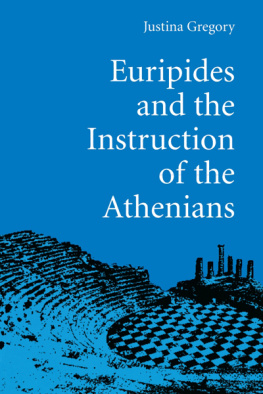
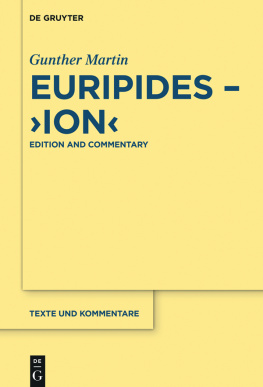




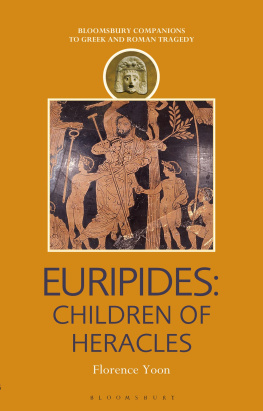
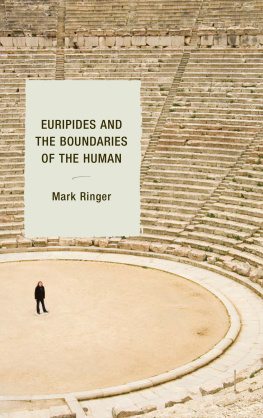


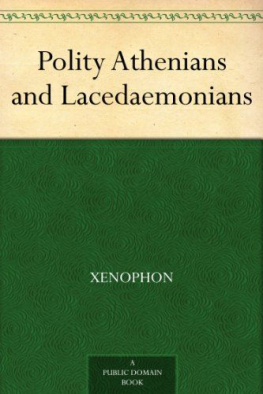

![Euripides - Classic Greek Drama: 10 Plays by Euripides in a Single File [NOOK Book]](/uploads/posts/book/43473/thumbs/euripides-classic-greek-drama-10-plays-by.jpg)